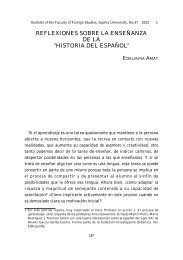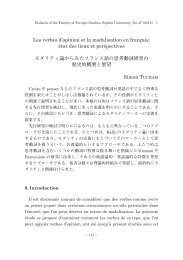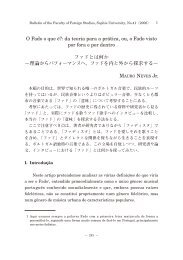Forgotten Paths to NEPA: A Historical Analysis of the Early ...
Forgotten Paths to NEPA: A Historical Analysis of the Early ...
Forgotten Paths to NEPA: A Historical Analysis of the Early ...
You also want an ePaper? Increase the reach of your titles
YUMPU automatically turns print PDFs into web optimized ePapers that Google loves.
Joseph DiMen<strong>to</strong> and Kazu<strong>to</strong> Oshio<br />
II<br />
The year 1970 has been widely considered as a great watershed in <strong>the</strong> his<strong>to</strong>ry<br />
<strong>of</strong> <strong>the</strong> United States as well as <strong>of</strong> environmentalism. The year was marked by a<br />
variety <strong>of</strong> important events, including <strong>the</strong> National Environmental Policy Act<br />
(<strong>NEPA</strong>), 4 <strong>the</strong> birth <strong>of</strong> academic programs focused on bringing interdisciplinary<br />
knowledge <strong>to</strong> national needs (e.g. <strong>the</strong> Social Ecology Program at <strong>the</strong> University <strong>of</strong><br />
California, Irvine), and <strong>the</strong> first Earth Day, 5 just <strong>to</strong> name a few. Indeed, many<br />
consider <strong>the</strong> 1970s as <strong>the</strong> environmental decade and <strong>the</strong> year 1970 as <strong>the</strong> great<br />
beginning.<br />
However, many questions remain unanswered. For instance, while <strong>NEPA</strong> is<br />
now considered <strong>to</strong> be <strong>the</strong> most sweeping environmental law ever passed by <strong>the</strong><br />
United States Congress, as A. Clay Schoenfeld points out, nearly every major<br />
U.S. newspaper at <strong>the</strong> time failed <strong>to</strong> report <strong>the</strong> passage <strong>of</strong> <strong>the</strong> act. Why was <strong>the</strong>re<br />
such media inattention? 6<br />
Ano<strong>the</strong>r question is: what prompted <strong>the</strong> dramatic transformation from public<br />
inattention <strong>to</strong> hyper attention? In fact, <strong>the</strong>n as well as now, many wondered<br />
how and why such his<strong>to</strong>rical changes occurred. For example, as early as 1970,<br />
Barry Commoner commented that <strong>the</strong> “swift” emergence <strong>of</strong> environmental problems<br />
“as<strong>to</strong>nished” most <strong>of</strong> <strong>the</strong> American public:<br />
The sudden public concern with <strong>the</strong> environment has taken many people by<br />
surprise. After all, garbage, foul air, putrid water, and mindless noise are<br />
nothing new; <strong>the</strong> sights, smells, and sounds <strong>of</strong> pollution have become an<br />
accus<strong>to</strong>med burden <strong>of</strong> life. To be sure, <strong>the</strong> mess has worsened and spread in<br />
<strong>the</strong> last decade, but not at a rate <strong>to</strong> match <strong>the</strong> dramatic, nearly universal<br />
reaction <strong>to</strong> it that has hit <strong>the</strong> country in <strong>the</strong> past year. 7<br />
While pollution clearly demanded action, Commoner argued, it was not so clear<br />
how <strong>the</strong> environmental issues and movement came about.<br />
Not only social commenta<strong>to</strong>rs but also legal scholars noticed a sudden change<br />
in his<strong>to</strong>rical currents. For instance, Richard Lazarus, a law pr<strong>of</strong>essor at George<strong>to</strong>wn<br />
University, looks back <strong>to</strong> 1970 and comments that in “a relative blink <strong>of</strong> an eye<br />
for <strong>the</strong> lawmaking process in most moments <strong>of</strong> his<strong>to</strong>ry, <strong>the</strong> legal landscape transformed<br />
completely.” While a few isolated states were making some efforts and<br />
common law property and <strong>to</strong>rt doctrines were invoked on behalf <strong>of</strong> environmen-<br />
21
















